Towards Inclusive Religious Education in the Netherlands and Indonesia
International conference on Inclusive Religious Education provides enlightening discussions and presentations
by: Ahmad Junaidi/SEJUK and June Beckx/Consortium
Religious leaders, scholars, experts, peace activists and state officials participating in the International Conference on Inclusive Religious Education held in Ambon, Maluku from Aug. 24 to August 26, 2016, shared experiences and exchanged knowledge about the role of inclusive religious education in strengthening openness, mutual understanding and peace.
Organized by the Netherlands-Indonesia Consortium for Muslim-Christian Relations, in cooperation with the Institut Agama Islam Negeri Ambon (Islamic State University, Ambon, IAIN) and Universitas Kristen Indonesia Maluku (Christian University Maluku, UKIM), the conference was fully endorsed and supported by the local government of Maluku, The Indonesian Ministries of Foreign Affairs and Religious Affairs, the Indonesian Embassy in the Netherlands and the Embassy of the Netherlands in Indonesia.
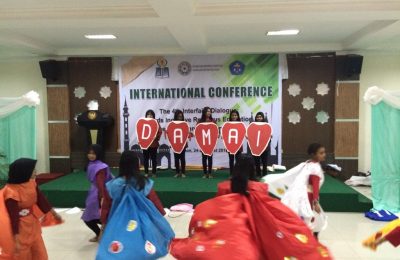 At the opening ceremony, held in the Maluku Islamic Center, Maluku’s Governor Ir. Said Assagaf, praised initiatives of peace and tolerance and revealed plans to develop a Tolerance kampong (village) where residents with various religious backgrounds would be accommodated. Dancers and singers performed a cultural expression on a peaceful and tolerant Ambon, a region once destroyed by a communal conflict. Participants witnessed an Angkat Pela (brotherhood agreement) between the Campuses of IAIN and UKIM, performed by their respective rectors.
At the opening ceremony, held in the Maluku Islamic Center, Maluku’s Governor Ir. Said Assagaf, praised initiatives of peace and tolerance and revealed plans to develop a Tolerance kampong (village) where residents with various religious backgrounds would be accommodated. Dancers and singers performed a cultural expression on a peaceful and tolerant Ambon, a region once destroyed by a communal conflict. Participants witnessed an Angkat Pela (brotherhood agreement) between the Campuses of IAIN and UKIM, performed by their respective rectors.
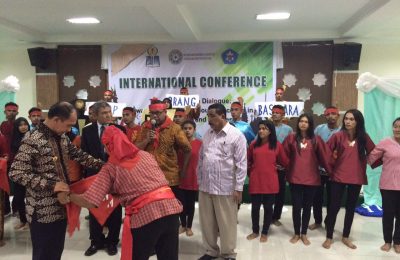 The first seminars that day (‘Religious Education and State Regulation’, ‘Inclusive Religious Education in Dutch and Indonesian schools: teaching programs revisited’) were elaborating on the State’s policy regarding Religious Education in both countries and how initiatives propagating ‘Inclusive Religious Education’ were programmed and implemented in Dutch and Indonesian schools and communities.
The first seminars that day (‘Religious Education and State Regulation’, ‘Inclusive Religious Education in Dutch and Indonesian schools: teaching programs revisited’) were elaborating on the State’s policy regarding Religious Education in both countries and how initiatives propagating ‘Inclusive Religious Education’ were programmed and implemented in Dutch and Indonesian schools and communities.
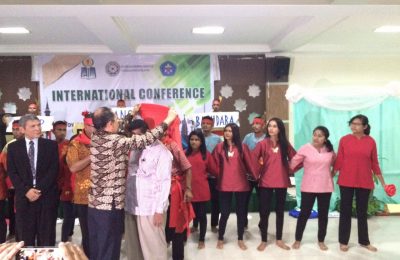 The sessions on the second day (‘Religious Education in schools: the practice in the classroom’, ‘Youth, Religious Education and the Network society’, ‘Cultivating sensitivity for interreligious approaches in society’) which all took place at the venue of UKIM, offered personal experiences and initiatives of young teachers, lecturers and researchers at schools with different religious backgrounds. The initiatives spoke of courage, worries for future generations and the urge to overcome the trauma’s of the past and restore faith in a common religious, but peaceful and tolerant future.
The sessions on the second day (‘Religious Education in schools: the practice in the classroom’, ‘Youth, Religious Education and the Network society’, ‘Cultivating sensitivity for interreligious approaches in society’) which all took place at the venue of UKIM, offered personal experiences and initiatives of young teachers, lecturers and researchers at schools with different religious backgrounds. The initiatives spoke of courage, worries for future generations and the urge to overcome the trauma’s of the past and restore faith in a common religious, but peaceful and tolerant future.
In the final session of the conference (‘Future Plan’) on the third and last day, the participants gathered suggestions and ideas out of the lessons learned, knowledge exchanged and experiences heard during the previous
sessions. Based on some guidelines, the conference was then divided in working groups to discuss common matters of priority and action to be tackled jointly in The Netherlands and Indonesia, now and in the near future. Finally it was decided that a small working team will consider all ideas and develop them into strategy for the next concrete steps of the Consortium.
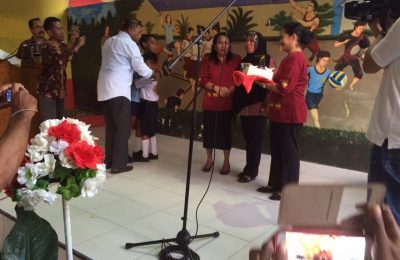 Besides the insightful discussions, the conference learned how local wisdom and traditions, such as Pela Gandong and the ceremonies, Angkat Pela and Panas Pela, contribute to the peace process in the society of Ambon, Maluku. At the end of the program, participants of the conference were invited to visit several places of worship beside the IAIN Ambon Campus. Absolute highlight of the whole event in Ambon was witnessing and joining in an emotional and moving Panas Pela (brotherhood agreement) between teachers and pupils of the Christian SMPN 9 and Muslim SMPN 4 public junior high schools.
Besides the insightful discussions, the conference learned how local wisdom and traditions, such as Pela Gandong and the ceremonies, Angkat Pela and Panas Pela, contribute to the peace process in the society of Ambon, Maluku. At the end of the program, participants of the conference were invited to visit several places of worship beside the IAIN Ambon Campus. Absolute highlight of the whole event in Ambon was witnessing and joining in an emotional and moving Panas Pela (brotherhood agreement) between teachers and pupils of the Christian SMPN 9 and Muslim SMPN 4 public junior high schools.
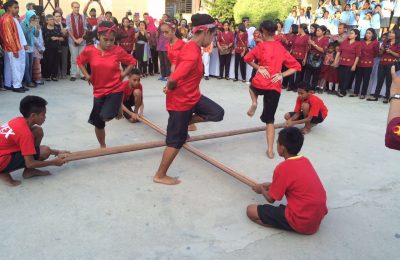 In an extended narrative Vrede in Gods naam, Nora Asrami and Kamel Essabane, two members of the visiting Dutch delegation consisting of 10 Muslims and Christians, described their experiences. Coming from the controversial Muslim minority in the Netherlands, they commit themselves to strive for a Dutch society as a home for all citizens, regardless of origin and religion. “..We should celebrate our multifaceted Dutch society, not through texts, but much more with music and dance …”, was the most important thing they learned in Ambon..
In an extended narrative Vrede in Gods naam, Nora Asrami and Kamel Essabane, two members of the visiting Dutch delegation consisting of 10 Muslims and Christians, described their experiences. Coming from the controversial Muslim minority in the Netherlands, they commit themselves to strive for a Dutch society as a home for all citizens, regardless of origin and religion. “..We should celebrate our multifaceted Dutch society, not through texts, but much more with music and dance …”, was the most important thing they learned in Ambon..
Steering Committee member and program officer Global Ministries of the Protestant Church in the Netherlands Corrie van der Ven, cites Dr. Etha Hendriks (UKIM) in an article in the Church’s newsletter Partnerschap gaat om het delen van zorgen en gaven, who explains how the Pela-bond implicates a partnership that not only shares grace, but grief as well.